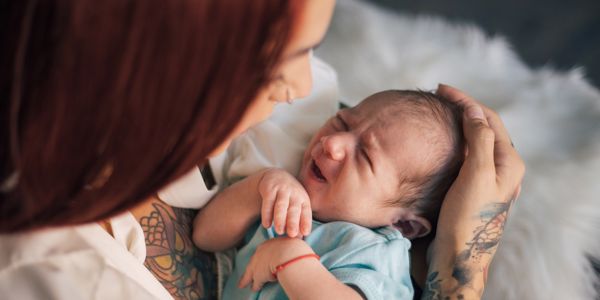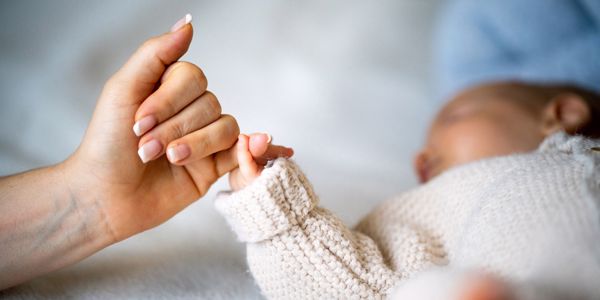The birth of a child is often considered to be one of the most joyous moments in a person's life, however, in reality, there can be moments during pregnancy and childbirth that can be considered traumatic or distressing.
It has long been recognised that following a difficult childbirth, some people may go on to develop psychological problems, however, it is only relatively recently that it has become accepted that a number of people go on to develop Post Traumatic Stress Disorder (PTSD) as a result.
To mark Maternal Mental Health Awareness Month, PTSD UK want to take a moment to highlight and raise awareness of Postnatal PTSD to ensure that everyone can get the support and help they may need if they experience a difficult birth.
What is Postnatal PTSD?
Postnatal PTSD is a type of Post Traumatic Stress Disorder (PTSD) that can occur after childbirth. It is estimated that approximately 9% of people who have given birth experience Postnatal PTSD.
The condition is often caused by a traumatic childbirth experience, which can include complications during delivery, a difficult labour, emergency C-sections, or a traumatic birth environment, but it’s vital to understand that Postnatal PTSD isn't necessarily always caused by sensational or dramatic events during childbirth or pregnancy.
There can be a complicated mix of objective (e.g. the type of delivery) and subjective (e.g. feelings of loss of control) factors which can cause Post-natal PTSD such as:
- You had a very lengthy labour
- You had a very painful labour
- You had an assisted birth with ventouse or forceps
- You had an emergency caesarean section
- Your baby was born with a disability
- Your baby spent time in special care
- You feared for your, or your baby's life or health, during or after the birth
- You felt powerless during the birth
- Your medical carers were unsupportive or unsympathetic
- You've had a traumatic event in your past
- You felt you were not in control
- here were high levels of medical intervention
- You felt you were not being listened to
- You felt a lack of information or explanation
- You felt a lack of privacy and dignity
- You experienced poor postnatal care
- The birth had to be induced
Why Is It Important to Recognise Postnatal PTSD and What Should I Look Out For?
The impact of postnatal PTSD can be significant. People with postnatal PTSD may find it difficult to bond with their baby or may feel guilty about their inability to enjoy their newborn.
The condition can also have an impact on relationships with partners and family members and may lead to social isolation.
If left untreated, postnatal PTSD can have long-term effects on mental health, however, the perceptions of childbirth and experiences can vary wildly, and so people with postnatal PTSD frequently find themselves very isolated and detached from other parents who may find it hard to understand how much a bad birth or pregnancy can affect them, so they don’t reach out for help.
Postnatal PTSD can make sufferers feel lonely and depressed as they often feel they are somehow ‘weaker’ than others because they are unable to forget their birth experience, despite being told by others to ‘put it behind them’ or just ‘be grateful you’ve got a healthy baby’. This may also result in intense feelings of guilt.
Symptoms of Post-natal PTSD can vary from person to person, but common symptoms include:
- Intrusive thoughts or memories
- Nightmares or flashbacks which revisit images of labour and birth
- Avoidance of triggers that remind them of the trauma
- Hypervigilance (feeling on alert all the time)
- Anxiety and depression
- Fear of and avoidance giving birth in the future
- Difficulty in feeding
- Lack of interest in, and avoidance of, sex and shunning physical contact
- Difficulty with bonding with your baby, and guilt as a result
- Avoidance of medical treatments like smear tests
- Some people may also experience physical symptoms such as headaches, chest pain, or difficulty breathing.
Is Postnatal PTSD the Same as Postnatal Depression?
It is important to note that postnatal PTSD is not the same as postnatal depression, although they can have some similar symptoms, and the two conditions can coexist.
Postnatal depression is a type of depression that can occur after childbirth and is characterized by feelings of sadness, hopelessness, and fatigue. Due to the similarity in symptoms, and the current lack of awareness of PTSD and C-PTSD, many people are often misdiagnosed with postnatal depression (or only diagnosed with one condition when they actually have both).
Research shows that up to 25% of people who have postnatal PTSD could remain undetected because they are also experiencing postnatal Depression, so the PTSD goes undiagnosed.
What Do I Do if I Think My Partner or I May Have Postnatal PTSD?
Acknowledging that you may have postnatal PTSD can be hard, and the changes in your mental health may have felt so gradual you might not have noticed the issues. You may feel that your symptoms are simply due to adapting to a new life as a parent or from lack of sleep, perhaps.
If you feel that you may be experiencing symptoms of postnatal PTSD, speak to your midwife, GP or health visitor about how you're feeling.
It is important to know that it is possible for postnatal PTSD to be successfully treated, even years after the birth occurred, which means it is never too late to seek help.
For some people, the first step may be 'watchful waiting', then exploring therapeutic options such as individual or group therapy. NICE guidance (updated in 2018) recommends trauma-focused psychological treatments such as EMDR, and trauma-focused cognitive behavioural therapy (CBT). You may also want to explore holistic non-pharmacological therapies, or talk to your doctor about treatment with appropriate prescription drugs.
Traumatic events can be very difficult to come to terms with, but confronting and understanding your feelings and seeking professional help is often the only way of effectively treating PTSD.
You can find out more about the causes, symptoms and treatments of Post Traumatic Stress Disorder on the PTSD UK website, along with information about PTSD in birthing partners, and PTSD as a result of pregnancy loss (including miscarriage, ectopic pregnancy, stillbirth, SIDS, terminating a pregnancy for medical reasons (TFMR) and new-born deaths).







